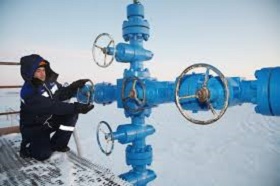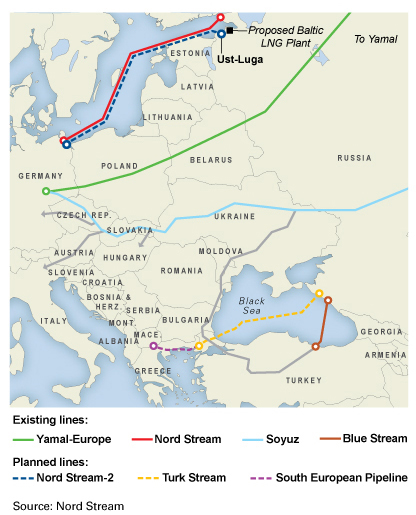Direct Speech, Economics, EU – CIS, Gas, Gas Market , Russia
International Internet Magazine. Baltic States news & analytics
Sunday, 01.02.2026, 19:05
Contradictory US Pipeline Diplomacy
 Print version
Print version |
|---|
Amos Hochstein, the State Department's envoy for international energy
affairs, has been on a tour de force in Eastern Europe this summer, in
part to lobby on behalf of US LNG exporters, and in part to counter
efforts by Russian diplomats and energy officials aimed at advancing
infrastructure projects that, in Washington's assessment, threaten to
prolong Moscow's political and economic grip on the region. Included in
Russia's project wish list are Nord Stream-2, a link to Germany under
the Baltic Sea; South Stream, a similar underwater pipe beneath the
Black Sea to Bulgaria and eventually Austria; and Turk Stream, a Black
Sea alternative to Turkey and Greece. All these are direct, multibillion
dollar links between Russia and its European gas customers that would
make shipments of Russian gas via Ukraine unnecessary.
Russian Gas Pipelines to Europe
In many ways this Washington-Moscow standoff is straightforward energy geopolitics like the world is used to seeing, only this time the focus is Ukraine. Washington argues that if European Union leaders and European governments play into the hands of Russia's Gazprom, which wants to minimize, if not altogether end, the use of Ukraine as a transit corridor for gas, then they will deprive Kiev of transit fees. Hochstein's message, delivered repeatedly in recent weeks, is that Ukraine would not survive such a blow and its economy will "collapse" (NC Aug.11'16).
On the face of it, this is true -- and explains why Russia is dead set on circumnavigating Ukraine for gas deliveries to Europe. For all its talk that Ukraine's pipe system is in poor condition, Moscow really wants Kiev to "pay the price" for its strategic shift to the West. And the best way to do that is to pull the transit rug from beneath Kiev's feet. This year about 73 billion cubic meters of Russian gas will cross Ukrainian territory (including to Turkey and Moldova); of this, some 60 Bcm will go to European consumers (including non-EU members such as Serbia), or approximately 35% of Gazprom's total deliveries to this core market. In return, Ukraine will receive about $2 billion in transit fees. Factoring the country's devastating post-revolution economic decline, this is now over 2% of GDP. Take away this income source, and one can get a sense of the pain Ukraine, which itself stopped importing Russian gas last November, would experience.
However, dogmatically preserving this revenue flow for Ukraine's sake is not sound policy. It is a recipe for stagnation for both Ukraine and Europe's approximate 460 Bcm per year gas market. The West would be wiser to help Ukraine diversify its economy rather than prop it up with Soviet-era gas architecture. Ukraine has a surprisingly strong, diverse agricultural-industrial sector, and there is an enormous amount to be done to reinvigorate and transform it into a more effective exporting machine. Of course, this is a far more daunting task than leaning on a tried-and-true network of pipes and compressors, but the hard work has to start somewhere. If Washington wants to shield Ukraine from the loss of Russian gas transit, helping Kiev mobilize the real economy will bring the most tangible benefit in the long term and also reduce its economic dependence on Moscow, rather than perpetuate it.
Ukraine as a Gas Storage Hub
Besides,
Ukraine's gas infrastructure will still have an important role to play
in Europe's energy future even if there is minimal or no Russian product
involved. Ukraine has over 30 Bcm of storage capacity, the equivalent
of one-third of Europe's, and only half of this is used now that
consumption has greatly reduced in the past three years. What is
preventing Ukraine from monetizing this underutilized asset by leasing
out storage to neighbors such as Bulgaria, Poland, Serbia, Turkey, and
private gas traders who lack such capacity? The answer is all too
commonplace for Ukraine: infighting and corruption. But the storage
potential is significant and could provide a measure of added supply
security for gas consumers in Eastern Europe, while generating revenue
to offset the loss of $2 billion in transit fees for Kiev. Europe as a
whole needs to expand gas storage capacity to provide an adequate level
of supply security, and Ukraine could be part of that solution.
In the new, interconnected Eastern European gas market, more natural gas will be flowing in a north-south direction, and western Ukraine with all its pipelines and underground caverns is right there to participate in the action. This is why Washington is absolutely right to encourage infrastructure development, such as interconnector pipelines and LNG terminals, in the region. To its credit, Washington has been one of the strongest supporters of building LNG import stations in Croatia and Greece. Beyond just creating more outlets for US Gulf Coast LNG exporters like Sabine Pass, such facilities diversify suppliers and supply routes for large swaths of Eastern Europe.
Furthermore, just because Russia wants to deprive Ukraine of transit income does not necessarily mean the myriad pipeline projects are a waste of money, a claim often voiced by critics. Look at the map, they say: the straightest point from West Siberia's gas fields to central Europe is through Ukraine. This might be so, but it's simplifying a complex, mercurial relationship. Supply security rests on multiple pipelines and reducing reliance on transit states, which can add instability and vulnerability to commercial links. What's more gas fields change over time, tariffs change, and consumption patterns change. What holds now might not be so relevant in five or 10 years. In this sense, gas corporations, not governments, are better equipped to determine which infrastructure is best for markets. Let shareholders decide whether a company should partner with Gazprom to lay down new pipelines. It is only natural that supplier and consumer establish direct connections rather than depend on transit nations, particularly those that, like Ukraine, are hampered by political risk. Furthermore, as US diplomats recognize, there is a natural codependence between Russia and its primary gas export market in Europe. Multiple pipelines with surplus capacity are beneficial to Europe's supply security and Russia's security of demand.
For Ukraine, if the loss of Russian gas transit is inevitable, there is still time to adjust. In the best-case scenario, Gazprom might get one 15.7 Bcm per year pipe to Turkey (all gas straight out of Ukraine's transit balance) up and running by 2020. From there, anything can happen, and much will depend on how Brussels will resolve a growing rivalry between Northern Europe, which wants Nord Stream-2, and southeastern Europe, which is keen on South Stream, a project Brussels stonewalled for years before Moscow walked out in 2014. This won't be easy for an already beleaguered Brussels, and could play into Ukraine's hands and allow transit to continue for a bit longer. In the interim, Kiev must prepare itself for a steady decline in transit revenues. Luckily, it has a slew of viable options as its economy starts to recover from three years of catastrophe, and Washington, for its part, should help every step of the way.
For European energy security, the natural linkage with Russia would be strengthened by new pipelines but it must be counter-balanced by a diversification of supplies through LNG import options from the US and elsewhere as well as greater inter-connectivity across the entire European pipeline system and expanded storage, some of it for strategic as well as commercial purposes. The big obstacle to this kind of enhanced European energy security is not Russia or Ukraine, but rather the steady decline in gas demand in Europe, which puts all new European gas infrastructure projects at risk.








 «The Baltic Course» Is Sold and Stays in Business!
«The Baltic Course» Is Sold and Stays in Business!

